|
|
|
Sort Order |
|
|
|
Items / Page
|
|
|
|
|
|
|
| Srl | Item |
| 1 |
ID:
181837
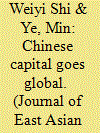

|
|
|
|
|
| Summary/Abstract |
The Belt and Road Initiative (BRI), and China's state-led model for economic globalization more generally, have attracted controversy: Are state-led overseas investment and lending driven by strategic motives or market rationale? How have the recipient economies reacted to the influx of Chinese capital? This special issue sheds light on these questions by first outlining the fragmented state system driving the BRI, a system featuring both Beijing's strategic logic at the top and market considerations in policy implementation. The role of the state is unpacked further in China's globalizing coal industry and in the growth of Chinese industry export to BRI countries. Finally, the issue explores the mechanisms behind public backlash and political pushback facing China in Zambia and Australia. As the COVID-19 pandemic continues to shift China's relationship with the world, this special issue contributes to a more nuanced understanding of the modus operandi of Chinese capital going global.
|
|
|
|
|
|
|
|
|
|
|
|
|
|
|
|
| 2 |
ID:
181843
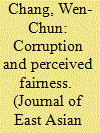

|
|
|
|
|
| Summary/Abstract |
Corruption can erode political trust and a well-functioning democratic system, but it is unclear whether perceptions of corruption are significantly associated with citizens’ perceptions about the fairness of income distribution. This study thus examines the role of political trust in shaping the relationship between perceptions of corruption and perceived fairness of income distribution for East Asian countries. The findings show that perceived corruption has strong detrimental effects on political trust, and that those who have lower levels of political trust are more likely to perceive the income distribution as unfair in their countries. Causal mediation analysis results indicate that political trust plays an important role in mediating the negative effect of perceived corruption on perceived fairness of income distribution. Moreover, the results from examining the mutual causality linking corruption, political trust, and perceived fairness suggest that the reciprocal causal effects are also significant and robust.
|
|
|
|
|
|
|
|
|
|
|
|
|
|
|
|
| 3 |
ID:
181838
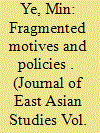

|
|
|
|
|
| Summary/Abstract |
Observers have portrayed the Belt and Road Initiative (BRI) variously, as China's great-power strategy, global infrastructure initiative, or commercial projects. Each characterization has had logical reasoning and evidence to support it. But how? How has one initiative been shown to have such varied motives? This article unpacks the Chinese state and establishes that a “tri-block” structure consisting of political leadership, bureaucracy, and economic arms has accounted for such varied motivations and actors in the BRI in China. In the BRI process, the leadership employed strategic rhetoric, and bureaucracies imposed policy ideas. Yet, more pervasively, the implementers have followed commercial motives in specific projects. BRI's strategic rhetoric and hazardous investment have generated external critiques and anti-China backlash, forcing Beijing to readjust the initiative. However, given the tri-block state structure, Beijing's policy adjustment will not be sufficient. Economic actors’ incentives need to be shifted too.
|
|
|
|
|
|
|
|
|
|
|
|
|
|
|
|
| 4 |
ID:
181839
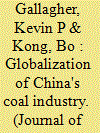

|
|
|
|
|
| Summary/Abstract |
This article examines the political economy of Chinese overseas development finance for coal fired power plants. In just over a decade China's two major policy banks provide more financing for overseas coal-fired power plant expansion than any other public financier in the world economy. We show how China's overseas surge in public financing for coal fired power plants is a function of a number of domestic push and foreign pull factors. Excess capacity, environmental regulation, and structural change are push factors that converge with rising demand for energy, pockets of coal abundance, and the lack of financing in Western capital markets for coal fired power plants. Fragmentation across the Chinese system and the demand for coal outside China's borders allow for a decline sector on the mainland to become a global Chinese powerhouse.
|
|
|
|
|
|
|
|
|
|
|
|
|
|
|
|
| 5 |
ID:
181840
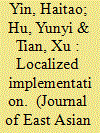

|
|
|
|
|
| Summary/Abstract |
China's overcapacities in manufacturing industries, including pollution-intensive industries, served as an important motivation of the Belt and Road Initiative (BRI). The popular Pollution Haven Hypothesis (PHH) therefore expects that the initiative will lead to the relocation of polluting industries from China to the recipients. Focusing on the implementation by local governments, we argue that actual outcomes of the BRI depend on the way local states and businesses respond to the BRI in accordance with their preferences. Through investigating industries’ actual responses to the BRI, we found that pollution-intensive industries have not relocated but rather expanded exports to the BRI countries. This has two implications: on the one hand, it alleviates the overcapacity issue in China and helps sustain the economic performance of the industry; on the other hand, it results in more pollution within Chinese borders and aggravates the environmental challenges facing the country.
|
|
|
|
|
|
|
|
|
|
|
|
|
|
|
|
| 6 |
ID:
181842
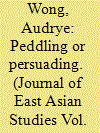

|
|
|
|
|
| Summary/Abstract |
With the globalization of Chinese capital, economic statecraft has become an increasingly prominent component of China's foreign policy. In this article, I examine China's use of economic inducements in developed democracies, a topic of growing concern for policymakers, focusing on the case of Australia. I show how Beijing's attempts to coopt public voices and influence Australia's foreign policy using non-transparent political donations and academic funding generated a strong backlash. At the same time, economic interdependence has provided a buffering effect, with key domestic actors in Australia advocating for cooperative relations, although this effect can in turn be limited by Beijing's coercive economic tactics. My findings underline the reputational costs of certain approaches to economic statecraft, the value of building supportive coalitions, and the challenges faced by China's authoritarian state capitalist model. They also highlight the impacts of globalized Chinese capital in developed democracies, including the resilience and vulnerabilities inherent in democratic political processes.
|
|
|
|
|
|
|
|
|
|
|
|
|
|
|
|
| 7 |
ID:
181841


|
|
|
|
|
| Summary/Abstract |
What drives public discontent about Chinese investment on the ground? This study probes the “ground truth” of public reaction in Zambia by documenting both the public perception and the actual impacts of Chinese investments. We find a “reputation deficit” for Chinese investment: Zambians are significantly less likely to support Chinese investment than investment from other countries. Combining results from an original household survey, interview records, and official statistics, we examine the drivers of this reputation deficit. Chinese firms are no worse at generating employment or adhering to labor and environmental standards than Western corporations operating in Zambia, according to official statistics as well as public opinion. However, Chinese firms possess a lower degree of localization, specifically in managers’ knowledge of local languages and the provision of culturally relevant benefits, and they are less likely to engage with the media. Our study highlights these previously overlooked causes of the reputation deficit.
|
|
|
|
|
|
|
|
|
|
|
|
|
|
|
|
| 8 |
ID:
181844


|
|
|
|
|
| Summary/Abstract |
This article builds on the theoretical debate over age, period, and cohort effects (APC) and explores how these factors might affect Taiwan's partisan stability. We conducted a two-level multinomial logit random effects model using survey data from 1991 to 2020 to disentangle the APC effects. Our findings challenge Converse's core assumption that partisanship strengthens with age. As a new democracy, Taiwan's party affiliations remain fluid, and we do find evidence of period effects, particularly associated with cross-Strait crises that favor the DPP. However, generational replacement is the most significant factor driving party identity changes in Taiwan. With generational replacement, the Kuomintang is burdened by the image of a century-old party. The Democratic Progressive Party (DPP) had previously fared better among young cohorts but has recently lost its support from millennials. The youngest generation increasingly refuses to associate with the traditional political parties. It seems reasonable to expect that the new generational forces will restructure the Blue–Green cleavage and expand the ideological diversity of Taiwan's party system.
|
|
|
|
|
|
|
|
|
|
|
|
|
|
|
|
|
|
|
|
|